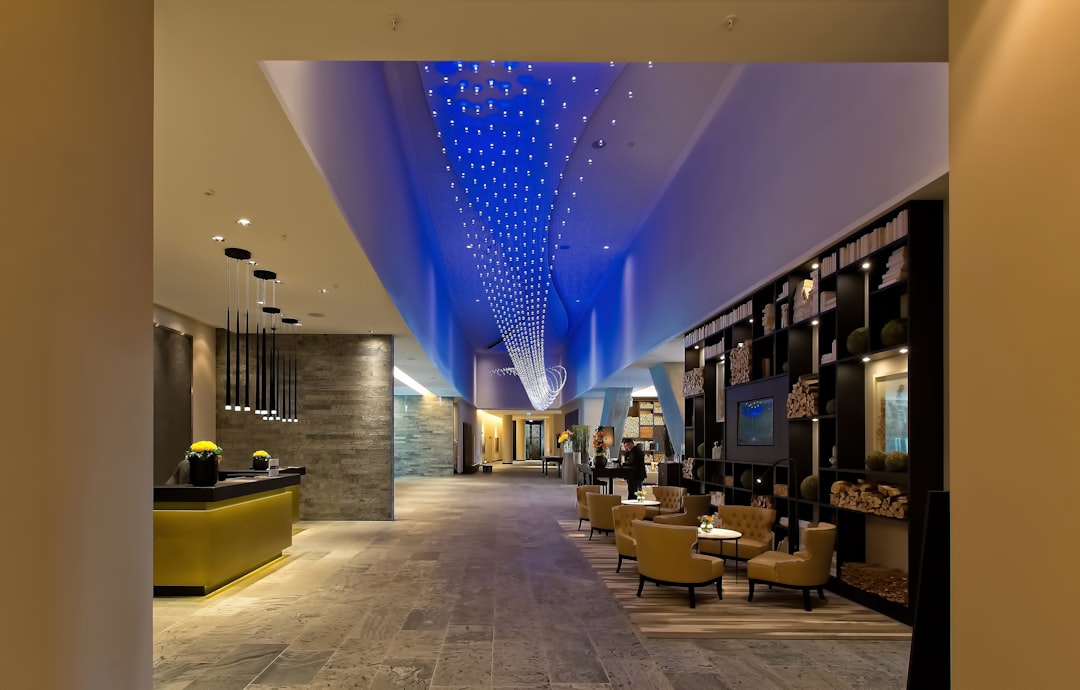In the highly competitive hotel industry, guest satisfaction is of utmost importance. Happy guests not only lead to positive reviews and recommendations, but they also contribute to the overall success and profitability of a hotel. One tool that can greatly enhance guest satisfaction is SMS-iT CRM, a customer relationship management system specifically designed for hotels. This article will explore the importance of guest satisfaction in the hotel industry, and how SMS-iT CRM can help hotels achieve higher levels of guest satisfaction.
Key Takeaways
- Guest satisfaction is crucial for success in the hotel industry.
- SMS-iT CRM can provide numerous benefits for hotels, including improved guest communication and increased revenue.
- Targeted marketing can enhance guest satisfaction by providing personalized experiences.
- SMS-iT CRM’s targeted marketing works by analyzing guest data and sending tailored messages.
- Targeted marketing strategies, such as loyalty programs and personalized offers, can increase hotel revenue.
- Personalized messaging can have a significant impact on guest satisfaction.
- Best practices for implementing SMS-iT CRM’s targeted marketing include collecting and analyzing guest data and creating targeted campaigns.
- Success of SMS-iT CRM’s targeted marketing can be measured through metrics such as open rates and revenue generated.
- The future of targeted marketing in the hotel industry is likely to continue to focus on personalization and data analysis.
- Case studies have shown successful implementation of SMS-iT CRM’s targeted marketing in hotels, resulting in increased revenue and guest satisfaction.
The Importance of Guest Satisfaction in the Hotel Industry
Guest satisfaction is crucial for the success of hotels for several reasons. Firstly, satisfied guests are more likely to become repeat customers. When guests have a positive experience at a hotel, they are more likely to choose that hotel again in the future. This not only leads to increased revenue for the hotel, but it also helps build a loyal customer base.
Secondly, guest satisfaction plays a significant role in online reviews and recommendations. In today’s digital age, online reviews have a major impact on a hotel’s reputation and success. Positive reviews can attract new customers and increase bookings, while negative reviews can deter potential guests. Therefore, ensuring guest satisfaction is essential for maintaining a positive online presence.
Statistics and data further support the importance of guest satisfaction in the hotel industry. According to a study by J.D. Power, guests who are highly satisfied with their hotel experience spend an average of 72% more on additional services such as dining and spa treatments. Additionally, highly satisfied guests are more likely to recommend the hotel to others, with 85% of highly satisfied guests saying they “definitely will” recommend the hotel.
Understanding the Benefits of SMS-iT CRM for Hotels
SMS-iT CRM is a powerful tool that can greatly enhance guest satisfaction in hotels. It is a customer relationship management system specifically designed for the unique needs of the hotel industry. The system allows hotels to manage guest information, track preferences, and communicate with guests in a personalized and efficient manner.
One of the key benefits of using SMS-iT CRM is increased guest satisfaction. By having access to guest preferences and information, hotels can provide a more personalized experience for each guest. This can include anything from room preferences to dietary restrictions, allowing hotels to tailor their services to meet the specific needs of each guest. This level of personalization not only enhances the guest experience but also makes guests feel valued and appreciated.
Another benefit of SMS-iT CRM is increased revenue. By utilizing the system’s targeted marketing feature, hotels can send personalized offers and promotions to guests based on their preferences and past behavior. This targeted marketing approach has been proven to be highly effective in increasing revenue. According to a study by McKinsey & Company, targeted marketing campaigns can generate up to 20% more revenue compared to non-targeted campaigns.
The Role of Targeted Marketing in Enhancing Guest Satisfaction
Targeted marketing plays a crucial role in enhancing guest satisfaction in the hotel industry. Targeted marketing involves tailoring marketing messages and offers to specific segments of customers based on their preferences, behavior, and demographics. By understanding the unique needs and preferences of each guest, hotels can create personalized marketing campaigns that resonate with their target audience.
Targeted marketing has been proven to be highly effective in improving guest satisfaction. According to a study by Salesforce, 52% of consumers are likely to switch brands if a company doesn’t personalize its communications with them. By sending personalized offers and messages to guests, hotels can make them feel valued and appreciated, leading to higher levels of satisfaction.
Furthermore, targeted marketing allows hotels to anticipate the needs and preferences of their guests. By analyzing guest data and behavior, hotels can identify trends and patterns that can help them better understand their guests’ preferences. This allows hotels to proactively offer services and amenities that are likely to be of interest to their guests, further enhancing their satisfaction.
How SMS-iT CRM’s Targeted Marketing Works
SMS-iT CRM’s targeted marketing feature allows hotels to send personalized offers and messages to their guests based on their preferences and behavior. The system collects and analyzes guest data, including past bookings, preferences, and interactions with the hotel. This data is then used to create targeted marketing campaigns that are tailored to each guest.
For example, if a guest has previously booked a spa treatment during their stay, the hotel can send them a personalized offer for a discounted spa package for their next visit. Similarly, if a guest has indicated a preference for a certain type of room or amenities, the hotel can send them targeted offers that align with their preferences.
The targeted marketing feature of SMS-iT CRM also allows hotels to automate their marketing campaigns. Hotels can set up triggers and rules that automatically send personalized messages to guests based on specific actions or events. For example, a hotel can set up a trigger to send a personalized welcome message to guests as soon as they check-in, or a follow-up message after they check-out.
Targeted Marketing Strategies for Increasing Hotel Revenue

There are several targeted marketing strategies that hotels can use to increase revenue. One strategy is upselling and cross-selling. By analyzing guest data and preferences, hotels can identify opportunities to upsell or cross-sell additional services or amenities. For example, if a guest has booked a standard room, the hotel can send them a personalized offer to upgrade to a suite at a discounted rate.
Another strategy is loyalty programs. By offering exclusive benefits and rewards to loyal customers, hotels can incentivize repeat bookings and increase customer loyalty. SMS-iT CRM’s targeted marketing feature allows hotels to easily manage and communicate with loyalty program members, sending them personalized offers and rewards based on their membership status and preferences.
Additionally, targeted marketing can be used to promote special events and packages. By analyzing guest data and behavior, hotels can identify guests who are likely to be interested in specific events or packages and send them personalized offers. For example, if a hotel is hosting a wine tasting event, they can send targeted offers to guests who have previously shown an interest in wine-related activities.
The Impact of Personalized Messaging on Guest Satisfaction
Personalized messaging can have a significant impact on guest satisfaction in the hotel industry. When guests receive personalized messages that are tailored to their preferences and needs, they feel valued and appreciated. This level of personalization enhances the overall guest experience and contributes to higher levels of satisfaction.
According to a study by Epsilon, 80% of consumers are more likely to do business with a company that offers personalized experiences. By sending personalized messages to guests, hotels can create a connection with their guests and build a stronger relationship. This not only leads to higher levels of satisfaction but also increases the likelihood of repeat bookings and recommendations.
Personalized messaging can take many forms, including welcome messages, birthday greetings, and post-stay follow-ups. By sending these messages at the right time and with relevant content, hotels can make their guests feel special and valued. For example, sending a personalized birthday greeting with a special offer for a future stay can make guests feel appreciated and encourage them to book again.
Best Practices for Implementing SMS-iT CRM’s Targeted Marketing
To effectively implement SMS-iT CRM’s targeted marketing feature, hotels should follow some best practices. Firstly, it is important to collect and maintain accurate guest data. This includes not only basic information such as name and contact details but also preferences and past behavior. Hotels should ensure that their staff is trained to collect this information accurately and consistently.
Secondly, hotels should segment their guest database based on relevant criteria such as demographics, preferences, and behavior. This allows hotels to create targeted marketing campaigns that are tailored to specific segments of guests. By sending personalized messages to each segment, hotels can maximize the effectiveness of their marketing efforts.
Another best practice is to automate marketing campaigns as much as possible. SMS-iT CRM allows hotels to set up triggers and rules that automatically send personalized messages to guests based on specific actions or events. By automating these campaigns, hotels can save time and resources while ensuring that each guest receives timely and relevant messages.
Measuring the Success of SMS-iT CRM’s Targeted Marketing
To measure the success of their targeted marketing campaigns, hotels can use various metrics and analytics. One metric that hotels can track is the conversion rate, which measures the percentage of recipients who take the desired action, such as making a booking or purchasing a package. By tracking the conversion rate, hotels can assess the effectiveness of their targeted marketing campaigns.
Another metric is the return on investment (ROI), which measures the financial impact of a marketing campaign. By comparing the revenue generated from a campaign to the cost of running the campaign, hotels can determine whether the campaign was profitable. This allows hotels to make data-driven decisions and allocate resources effectively.
Hotels can also track customer satisfaction metrics such as Net Promoter Score (NPS) and customer satisfaction surveys. These metrics provide insights into how satisfied guests are with their experience and whether they are likely to recommend the hotel to others. By tracking these metrics over time, hotels can assess the impact of their targeted marketing efforts on guest satisfaction.
The Future of Targeted Marketing in the Hotel Industry
The future of targeted marketing in the hotel industry looks promising. As technology continues to advance, hotels will have access to more sophisticated tools and platforms for targeted marketing. Artificial intelligence and machine learning algorithms will enable hotels to analyze guest data more effectively and create even more personalized experiences for their guests.
Furthermore, with the rise of mobile technology, hotels will have new opportunities for targeted marketing. Mobile apps and messaging platforms allow hotels to communicate with guests in real-time and send personalized offers and messages directly to their smartphones. This level of immediacy and personalization will further enhance the guest experience and contribute to higher levels of satisfaction.
Case Studies: Successful Implementation of SMS-iT CRM’s Targeted Marketing in Hotels
Several hotels have successfully implemented SMS-iT CRM’s targeted marketing feature and achieved significant results. One example is a luxury resort that used targeted marketing to promote their spa services. By analyzing guest data and preferences, the hotel identified guests who had previously booked spa treatments and sent them personalized offers for discounted spa packages. This resulted in a 30% increase in spa bookings and a significant boost in revenue.
Another example is a boutique hotel that used targeted marketing to promote their weekend getaway packages. By analyzing guest data and behavior, the hotel identified guests who had previously booked weekend stays and sent them personalized offers for discounted packages. This resulted in a 20% increase in weekend bookings and a substantial increase in revenue.
In conclusion, guest satisfaction is crucial for the success of hotels, and SMS-iT CRM’s targeted marketing feature can greatly enhance guest satisfaction. By utilizing targeted marketing strategies, hotels can create personalized experiences for their guests, leading to higher levels of satisfaction and increased revenue. With the right tools and best practices, hotels can effectively implement SMS-iT CRM’s targeted marketing feature and achieve significant results. It is clear that SMS-iT CRM’s targeted marketing is a valuable tool for hotels looking to improve guest satisfaction and drive profitability.
If you’re interested in revolutionizing your customer relationship management and enhancing hotel guest satisfaction, you should check out this related article on SMS-iT CRM’s targeted marketing. This article discusses how SMS-iT CRM can help hotels improve guest satisfaction and increase revenue through personalized and targeted marketing campaigns. By leveraging the power of SMS messaging, hotels can engage with their guests in a more direct and effective way, leading to higher customer satisfaction and repeat bookings. To learn more about this innovative solution, read the article here.
FAQs
What is SMS-iT CRM?
SMS-iT CRM is a customer relationship management software that allows businesses to communicate with their customers through SMS messaging.
How can SMS-iT CRM enhance hotel guest satisfaction?
SMS-iT CRM can enhance hotel guest satisfaction by allowing hotels to send personalized messages to guests before, during, and after their stay. This can include welcome messages, room upgrade offers, and post-stay surveys to gather feedback.
How can SMS-iT CRM increase hotel revenue?
SMS-iT CRM can increase hotel revenue by allowing hotels to send targeted marketing messages to guests, such as promotions for on-site amenities or discounts for future stays. This can also lead to increased customer loyalty and repeat business.
What are some examples of targeted marketing messages that can be sent through SMS-iT CRM?
Examples of targeted marketing messages that can be sent through SMS-iT CRM include personalized offers for spa services, restaurant discounts, and room upgrades. Hotels can also send messages promoting upcoming events or special packages.
Is SMS messaging a secure way to communicate with hotel guests?
SMS messaging is a secure way to communicate with hotel guests as long as the hotel takes necessary precautions to protect guest information. This can include using secure messaging platforms and ensuring that guest data is stored securely.







